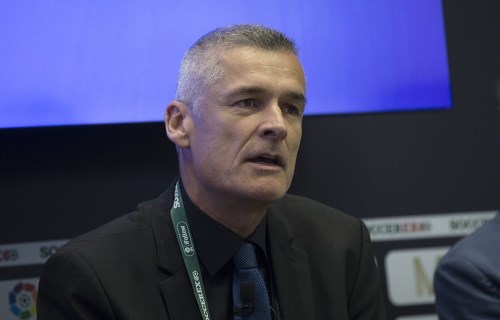First mega-event to have specific human rights included pre-bidding yet to come

Head of Children Win Campaign, Marc Joly, speaking at the Soccerex Global Convention 2017. Photo: Ross Brownlee/Imagine Images for Soccerex
20.09.2017
By Steve MenaryThe 2022 Commonwealth Games will be the first sports mega-event to include specific child and human rights before the bidding actually starts.
The South African city of Durban recently withdrew due to financial considerations and a number of cities including Birmingham in England, Victoria in Canada and Kuala Lumpur in Malaysia are expected to enter the re-run bid process.
Guy Price, head of sport at the UK branch of UNICEF, said: “Since Durban withdrew for 2022, it’s likely because of our relationship and the work we do with [charity] Terre de Hommes and the Commonwealth Games Federation that we are able to insert child and human rights considerations criteria into all the current and on-going selection process for 2022.
“So our hope is that the 2022 Commonwealth Games is likely to be the first mega-event to have explicit child and human rights criteria built into the event from the outset.”
Mr Price was speaking on a panel at the recent Soccerex Global Convention on Mega Events and Human Rights, along with Marc Joly, head of the Children Win campaign at the Terre des Hommes charity.
Mr Joly said there would be human rights criteria in the bid documents for the FIFA 2026 World Cup, but what remained to be decided was how much attention was paid to these criteria.
This June, FIFA published a human rights policy but Mr Joly said: “The big question will be on the weight of the human rights criteria. We are still at the start of the journey. We are at the start of how the sport governing body manages that phase but the question will be more likely to be raised on these elements.”
In May 2017, UEFA also agreed specific human rights clauses but a senior representative from European football’s governing body admitted that the issue of human rights at two of the 13 cities due to host Euro 2020 could be ‘tricky.’
Patrick Gasser, UEFA’s senior Manager for Football & Social Responsibility, said: “We have Euro 2020 coming up and we have 13 host cities and probably we have 11 where we will not have a problem with human rights. We have two host cities, St Petersburg and Baku, where it might be a bit more tricky.”
Mr Gasser added that next year’s World Cup in Russia might make the situation in St Petersburg easier, but the agreement of new policies by both FIFA and UEFA is unlikely to be retrospective and only covers future mega events.
Steve Menary covered the Soccerex Global Convention 2017 for Play the Game.





